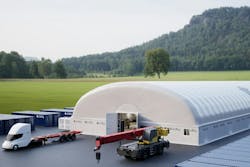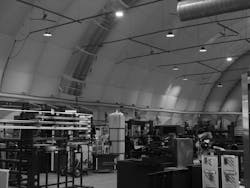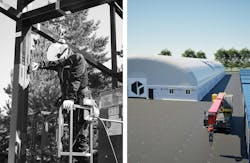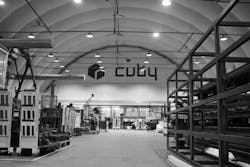Before he discusses his company, Cuby Technologies, cofounder Aleksandr Gampel first describes its context—the state of the home building industry today. “Everyone understands there’s a housing crisis,” he says.
That crisis has two main causes, Gampel explains. First, there’s a shortage of skilled labor, with not enough new hires to replace retiring workers. “Young people don’t want to be construction workers,” he says.
And second, while other industries have gained productivity and efficiency in recent decades, construction largely hasn’t. “Lean manufacturing works. It’s worked in every other industry,” he says.
To explain his company’s manufacturing solution, Gampel first distinguishes it from other efforts to industrialize construction. Take 3D printing, for example: “We don’t take that seriously,” he says, because 3D printing typically produces the framing only. “You’re deploying 90% of the build using traditional skilled labor.” That labor is both costly and in short supply.
Or consider volumetric modular construction. This method requires a massive capital expense to construct a large, centralized factory that ships containers across long distances. The economics are “impractical,” Gampel says. And while volumetric modular works well for repeatable products like hotels and student housing, he adds, it doesn’t easily provide the customization that consumers want.
“In a lot of the ecosystem, everyone has over-engineered a solution, so it’s not truly less expensive” than traditional home construction, Gampel says. Any new solution “has to be cheaper from day one.”
Enter: The Mobile Micro Factory
Cuby has devised that solution, Gampel says. Instead of constructing factories that ship out modular containers, Cuby produces what it calls mobile micro factories that are set up near the construction site, like on a rented parking lot. Each transportable factory produces homes for a 300-mile radius.
Cuby’s mobile micro factory is an inflatable dome of about 30,000 to 40,000 square feet that contains the entire home-construction production system. Inside the dome, machines and conveyor belts produce and prep all the elements of the home—windows, wall panels, plumbing pipes, drywall, HVAC systems, and so on—then package them into kits of parts. The factory gets sent out in about four dozen containers, and the dome gets erected in about eight weeks.
“We focus not on the home, the end product, but on the system,” Gampel says. “We take all the non-high-margin part of the builder’s business inhouse. The factory does all the general contractor and subcon work.”
Cuby’s software allows for customization, such as different layouts and finishes. And the company ensures that the parts it uses can be sourced from a big-box home improvement store in any market—in case of supply chain issues, for instance.
Skilled Labor Savings
Critically, Cuby’s system doesn’t require skilled labor. Instead of numerous trades (plumbers, electricians, framers) each doing their own thing, it takes just four unskilled laborers to assemble one code-compliant home in about 30 days. The workers have tablets that walk them through the entire process of turning the kit into a house. “When I say unskilled, I mean a warehouse worker that Amazon hires,” Gampel says.
The labor savings deliver an added benefit: Cuby can afford to use steel, not lumber, for the framing. Compared with lumber, steel is less prone to cutting errors, it’s more easily available, and its prices are less variable, Gampel notes. “Because we reduce the skilled labor and bring down the price, we can afford to use a higher-end material.”
It costs a builder about $100 per square foot to construct a Cuby home, compared with the national square-foot average of $150. “We make high-quality homes faster and more affordable,” Gampel says.
Perfecting the Process
But Cuby doesn’t sell homes; it sells the mobile micro factories at about $10 million to $15 million each. Cuby’s customers can be developers, builders, general contractors, private equity groups—and their customers, in turn, are typically midsize home builders.
Still in its early years, the startup has a research and development center in Minsk, Belarus—which is known for its engineering talent and where it’s less expensive to set up a facility, Gampel says. Here, Cuby produces and tests its micro factories and machinery. Its first mobile micro factory for a customer will soon head to Detroit.
Within the next decade, the startup plans to produce about 275 micro factories that will deliver about 200,000 homes, create around 300,000 jobs, and remove roughly 750,000 tons of waste from the construction process, Gampel says.
In addition, Cuby has built several model homes to demonstrate that it could. “It’s not hard to build a home,” Gampel says. “The hard part is replicating that millions of times.”



